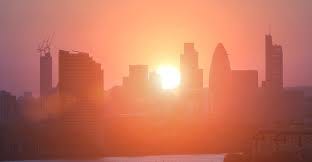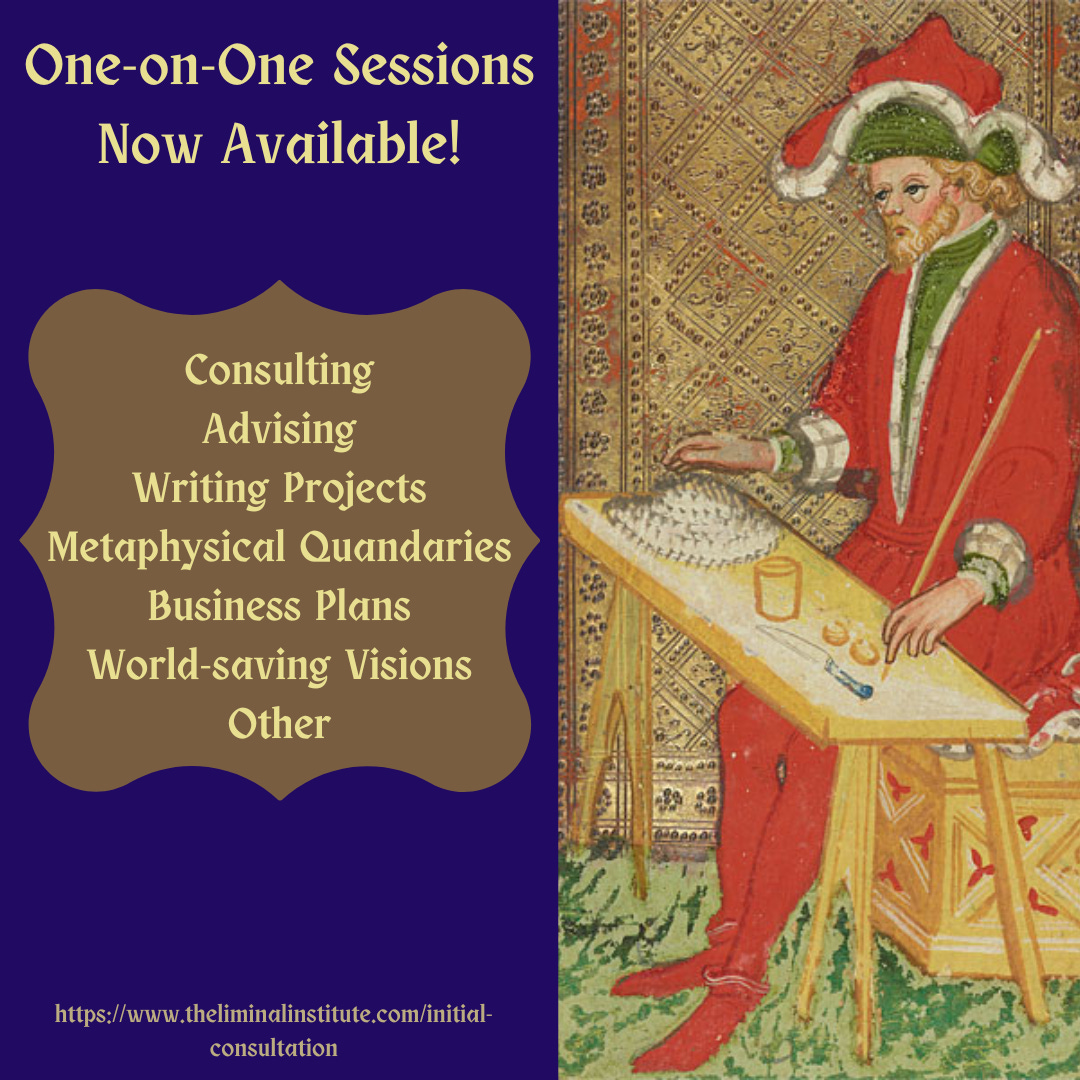Magic at the Edge of Time
Can we approach system change as an initiatory threshold?
By now, I hope everyone got the memo that we have entered a new phase of the climate emergency — warming is accelerating, and it poses a threat for all of us, not in some distant future, but immediately. Another part of the message that should be coming through loud and clear is that we can only address this deepening mega-crisis through systemic change, not incremental tinkering. (Actually, many people still don’t believe this, despite the brutal heatwave across Europe and the world. I wonder if they will only start to catch up when global famine hits, supply chains collapse, and power outages become the norm?)
Not that it matters if we do “get it." Almost everyone I know, among those “in the know,” continue to pursue their personal career goals. As if this system will go on forever, we launch our Apps, write our novels, direct our films, crisscross the world to DJ or speak at festivals, open new boutique hotels, and so on, continuously spewing doom-clouds of CO2 in the process. It is as if we are oblivious to the threat hanging over everything.
Of course, it does impact us and we’re not oblivious. But we hardly know what to do besides feeling guilt, which seems unproductive. We don’t know what truly meaningful action we can take. Therefore, we constantly detach, suppress the urgency.
As a thinker, I was an “early adaptor” to the ecological emergency. In Breaking Open the Head (2002), I proposed we were hurtling toward civilizational collapse and possible extinction without a collective awakening. 2012: The Return of Quetzalcoatl (2006) took seriously and amplified many indigenous prophecies and dire warnings (The New York Times and Rolling Stone, etc, mocked me for this). I also attempted to build a media, social technology, and local community infrastructure to directly face the emergency, with The Evolver Network (2008 - 2013 ish). At its peak, we linked sixty affiliated local groups exploring permaculture, plant medicine, lucid dreaming, alternative communities, indigenous knowledge, local currencies, and so on. How Soon Is Now (2017) explored the planetary emergency from a systems design perspective. To jumpstart the conversation, I devised a plan on how to transform our technical and social infrastructure, how to repurpose media and social networks to address glaring flaws and gaps in the collective consciousness.
As one core concept, I proposed that we cannot confront this systems-level, ecological and geopolitical emergency with a flat-land, materialist ideology. Environmental movements such as Extinction Rebellion, 350.org, GreenPeace, and so on fall short because they don’t point toward anything astonishing or galvanizing — a vision that excites the collective imagination, that directs people toward some new frontier or fabulous cutting-edge of possibility.
In “The Soul of Man Under Socialism,” Oscar Wilde wrote that people always need a next frontier — something beyond the known, a fantastic dream — to galvanize them to act. He wrote: “A map of the world that does not include Utopia is not worth even glancing at, for it leaves out the one country at which Humanity is always landing. And when Humanity lands there, it looks out, and, seeing a better country, sets sail. Progress is the realization of utopias.” Telling people to embrace a future of drastically reduced opportunity — with no silver lining — is deeply demotivating. It can’t work.
Once upon a time, globalized Capitalism and hyper-consumerism was an amazing, utopian project. Today, I can go into a deli and grab chocolate from Africa, blueberries from Argentina, rice noodles from Thailand. I can connect instantly with anyone across the world. This would have been impossible, bizarre to imagine, just two centuries ago. It is tragic and ironic that our success (albeit uneven) in fulfilling this utopian scheme has unleashed such drastic consequences.
I write in response to recent articles and videos from English journalist George Monbiot. Monbiot believes most people still don’t realize we are facing “the prospect of systemic environmental collapse.” In his article "Days of Rage," he argues, in retrospect, the ecological movement made a mistake in promoting “incrementalism” within Capitalism, rather than pursuing system change: “Only a demand for system change, directly confronting the power driving us to planetary destruction, has the potential to match the scale of the problem and to inspire and mobilize the millions of people required to generate effective action.”
Monbiot lists the solutions he supports: "private sufficiency, public luxury; doughnut economics; participatory democracy and an ecological civilisation." He notes: “None of these are bigger asks than those the billionaire press has made and largely achieved: the neoliberal revolution that has swept away effective governance, effective taxation of the rich, effective restraints on the power of business and oligarchs and, increasingly, effective democracy.” I have no argument with him here — his solutions align, more or less, with what I proposed in How Soon Is Now. What remains lacking is a feasible action plan: How do we generate the creative enthusiasm and participatory zeal to build this collective movement, to unleash this transformation?
I believe that such a project requires rhetorical and charismatic genius. We need an informal cabal of leaders and influencers to make an authentic call to the human heart that goes far beyond statistics and evidence. We must reach into the depth dimension of the individual and collective Psyche, overcoming cynicism, detachment, media hypnosis. Our movement needs to tap into numinosity, religiosity, revelation, illumination, salvation, redemption — to awaken humanity to a shared purpose; a sense of meaning and possibility that impels us beyond the known and familiar.
We need a new vision of what can be.
Is this likely or even possible? I can’t say. I don’t know. At the very least, if we can conceive of it, then it is conceivable. Many things that seem impossible in times of “normality” can become plausible in a life-threatening, all-consuming emergency.
I consider “analytic idealism,” defined by the philosopher Bernardo Kastrup, among others, as a necessary antidote to reductive materialism. Idealism needs to be woven into the broader counter-movement against the death-march of technocracy, corporate Capitalism, monocultural globalization. The evidence now solidly supports the thesis that consciousness is the underlying reality of the universe. What we experience as matter is just temporarily concretized or crystallized consciousness; the universe, in its totality, is like a living dream.
This also means, as Kastrup notes, that a “hermeneutics of everything” is a reasonable enterprise. As in a dream or fable, we have every reason to believe that the universe is an “interpretable world,” a symbolic structure and allegory, given to us to understand and interpret. And going beyond that, we have good reason to suspect that through our vital act of interpretation, we transform what we observe.
In other words, magic.
If we are “dissociated alters” of this unitary consciousness while we are alive, at death we should experience a reintegration — an expansion rather than an obliteration of awareness. And indeed, this is what we find in the accounts of many near death experiences (NDEs). There are universes of psychic and conscious experience — a vast range of possible mind-body states— that we can explore experientially. Society can pivot to focus in this direction.
This is also why I believe we should recapture the essence of the Christian mythos. Rather than hiding from it, ridiculing or abandoning it, we can resurrect this project for our time, in a new way. Hopefully, by doing so, we can “convert” the atheists/agnostics as well as the faithful to a new vision, a new ideal, based on a direct, unmediated relationship to the transpersonal or transcendent dimension, overcoming cynicism, alienation, and separation.
If “we,” collectively, must radically reduce our CO2 output and shrink our ecological footprint, this means creating (urban, suburban, and rural) communities that are resilient and largely self-sufficient. Instead of traveling for work or pleasure, we would commit to staying put — to build “local utopias,” participatory democracies, that embody the ideals and principles of the liberated, empathic society we yearn to see anyway. By building tangible, scale-able alternatives, we would strip the power away from the tiny coterie of the wealthy elite, who, Monbiot notes, built a system that traps the masses in debt and servitude while exploiting and desecrating nature for their own enrichment.
People can experience great joy and maintain intense focus while leading streamlined, de-commodified, minimalist lives, when they feel united with a greater purpose and intention. They can persevere through terrible ordeals when they know their actions have meaning. The archetype of Christ’s life represents the overcoming of cruel circumstances through willpower and devotion. This old story reminds us that a human being can undergo an alchemical transmutation, becoming a vehicle for something greater — for the species over-mind, perhaps, or the divine will. Similarly, we can face the planetary emergency as a great challenge and an extraordinary opportunity to transform ourselves through adversity.
How’s that for a marketing pitch?





You should have a discussion with Bernardo. He seems easy enough to reach. Until recently he responded to all of his Facebook threads; I think he still monitors them.
Also curious if you're familiar with Stephen Jenkinson's work. He voices an insistence upon meeting the demands of dying. I don't think I would have found the same urgency around my own mother's dying without his guidance. He talks about dying as the crucible the makes human beings- this obviously relates to initiations and the ecological crisis. Idealism plays an important role in understanding death at a metaphysical level, but I think what Stephen talks about is what is actionable in human life. And the thing that creates a context from which we can address all of our larger problems.
Ian McGilchrist seems important in this conversation as well. He's bridging the gap between science and idealism.
I’ve been thinking on this one for the last few days. Ruminating. Because yes, I also am moving forward with my life in a normal way. I do realize that big changes are coming, and living in Los Angeles the hard times are already creeping in. And yet what else can I do? Except continue my life, take care of my family, our dog, the garden. I’m working towards the good in my small in incremental way, and I also realize that it’s not enough. I guess I’m waiting for the vision of the future that we all can trust.